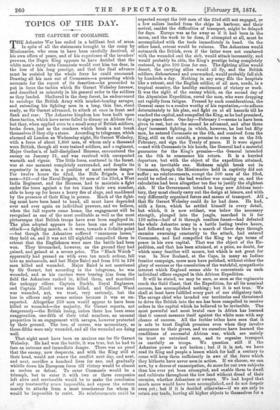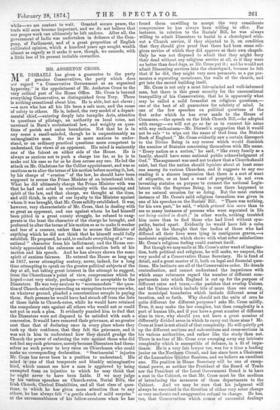TOPICS OF THE DAY.
THE CAPTURE OF C00111ASSEE.
THE Ashantee War has ended in a brilliant feat of arms. In spite of all the statements brought to the camp by Missionaries, who seem to have been carefully deceived, of his own offers of peace, and of his experience of the invaders' prowess, the Negro King appears to have decided that the white man's entry into Coomassie would cost him too dear, in the loss of his long prestige, and that the final advance must be resisted by the whole force he could command. Drawing all his men out of Coomassie—a proceeding which accounts for the report of its desertion—he proceeded to put in force the tactics which Sir Garnet Wolseley foresaw, and described so minutely in his general order to the soldiers as they landed. Sheltered in the deep forest, he endeavoured to envelope the British Army with musket-bearing savages, and extending his fighting men in a long, thin line, stood ready, as Sir Garnet advanced, to attack at once in front and flank and rear. The Ashantee kingdom has been built upon these tactics, which have never failed to dismay an African foe ; but they, when applied even to a small army of British soldiers, broke down, just as the crackers which break a nut break themselves if they clip a stone. According to telegrams, which alarmed all London on Wednesday night, Sir Garnet Wolseley, with a force of about 1,800 men, of whom only a thousand were British, though all were trained soldiers, and a regiment, Major Gordon's, of half-disciplined Houssas, encountered the enemy on January 31, and was received with unexpected warmth and vigour. The little force, scattered in the forest, was at one moment completely surrounded, and despite its superiority in arms, in a position of most serious danger. For twelve hours the 42nd, the Rifle Brigade, a few men—]25—of the Naval Brigade, 90 men of the 23rd, a West India Regiment, and the Houssas; had to maintain a fight under the trees against a foe ten times their own number, able to keep up for hours a heavy fire of slugs, and maddened by the presence of their King in person. Much of the fight- ing must have been hand to hand, all must have depended over and over again on individual prowess, and we believe, when the full reports come home, the engagement will be recognised as one of the most creditable as well as the most picturesque that British troops have ever been employed in. The plan adopted appears to have been one of incessant attack—a fighting march, as it were, towards a definite point —but though the Ashantees suffered "enormous losses," they held on, and it was not till nightfall compelled them to retreat that the Englishmen were sure the battle had been won. They bivouacked, however, on the ground they had gained, and gained at a severe price. The "Black Watch " apparently had pressed on with even too much ardour, fell into an ambuscade, and lost Major Baird and from 105 to 128 men killed and wounded. Major Baird is not mentioned by Sir Garnet, but according to the telegrams, he was wounded, and as his carriers were bearing him from the field the Ashantees rushed in, killed them, and murdered the unhappy officer. Captain Buckle, Royal Engineers, and Captain Nicoll were also killed, and Colonel Wood was wounded, not, we trust, very seriously, but the loss in officers only seems serious because it was so un- expected. Altogether 250 men would appear to have been killed or wounded—the majority, Sir Garnet reports, not dangerously—the British losing, unless there has been some exaggeration, one-fifth of their total numbers, an unusual proportion in an engagement with savages, however protected by their ground. The loss, of course, was momentary, as three-fifths were only wounded, and all the wounded are doing well.
That night must have been an anxious one for Sir Garnet Wolseley. He had won the battle, it was true, but he had to face an extreme and immediate danger. There was no proof that the enemy, now desperate, and with the King still at their head, would not renew the conflict next day, and next, and next, sacrifice a hundred lives for one, and gradually whittle down his European force till victory would be almost as useless as defeat. To enter Coomassie would be a triumph, but to enter it with two or three companies left alive and serviceable would be to make the conclusion of any trustworthy peace impossible, and expose the return march to attacks from a most treacherous- foe whom it would be impossible to resist. No reinforcements could he expected except the 500 men of the 23rd still not engaged, or a few sailors landed from the ships in harbour, and their arrival, amidst the difficulties of transport, might be delayed for days. Europe was as far away as if it had been in the moon, and the work to be done, if attempted at all, must be accomplished with the tools immediately in hand. On the other hand, retreat would be ruinous. The Ashantees would outmarch the British, even if the latter were not cumbered with the wounded and the sick, would attack incessantly, and would probably be able, the King's prestige being completely restored, to give 100 lives for one. The fighting allies would desert, the carrying allies would all fly, and the British soldiers, disheartened and overworked, would probably fall sick by hundreds a day. Nothing in any army fills the hospitals like a retreat, and the English soldier, of all men, needs, in a tropical country, the healthy excitement of victory or work. It was the sight of the enemy which, on the second day oi the Abyssinian Expedition, cured the men, who were dropping out rapidly from fatigue. Pressed by such considerations, the General came to a resolve worthy of his reputation,—to adhere- determinately to his plan, and fight on at all hazards till he reached the capital, and compelled the King, as he had promised, to sign peace there. One day—February 1—seems to have been given to rest, but on the second he advanced, and after three- days' incessant fighting, in which, however, he lost but fifty men, he entered Coomassie on the 4th, and received from the King, still on the outside, a promise to come in on the 5th February, and sign the Treaty of peace. If it were signed —and with Coomassie in his hands, the General had a material guarantee for the King's promise—the General intended on the 6th to commence his return. It is a hurried departure, but with the object of the expedition attained; it is an inevitable one. Sickness might break out in Coomassie, though the Missionaries held in captivity did not 'suffer ; no reinforcements, except the 500 men of the 23rd, could be relied on ; the bad weather was coming on, and the calculation had been altogether too fine to justify the slightest risk. If the Government intend to keep new African terri- tory, they must clearly carry out the design at leisure, and with. very differently organised forces and means of transport. Alt that Sir Garnet Wolseley could do he had done. He had, with a force, which he settled himself in every detail, but which, it is now evident, was below the necessary strength, plunged into the jungle, marched in it for 120 miles—half of it through roadless forest—had defeated': the whole Ashantee army in a battle lasting twelve hours, had followed up the blow by a march of three days through enemies swarming constantly to the attack, had entered Coomassie, and had compelled the King to sign terms of peace in his own capital. That was the object of the Ex- pedition, and that has been attained, at a price, no doubt, for which many families will mourn, but which is not great for war. In New Zealand, at the Cape, in many an Indian frontier campaign, more men have perished, without either the glory of success or the consolation of the watchful, sympathetic interest which England seems able to concentrate on each individual officer engaged in this African Expedition.
It will be stated, we may be sure, as soon as the regiments reach the Gold Coast, that the Expedition, for all its nominal success, has accomplished nothing ; but it is not true. We shall at least have fulfilled every part of our obligatory task. The savage chief who invaded our territories and threatened to drive the British into the sea has been compelled to receive. orders in the capital which he believed to be invincible. The most powerful and most brutal race in Africa has learned that it cannot measure itself against the white man with any chance of success. All the feebler tribes have seen that it is safe to trust English promises even when they involve- annoyance to their givers, and we ourselves have learned the conditions of successful African war, which are mainly to trust no untrained men, and to organise transport as carefully as troops. We question still if the Ashantee power is not broken ; but if it is not, we have read its King and people a lesson which for half a century to come will keep them sufficiently in awe of the force which they hitherto have never seen in action. If we choose, we can now, by a decree of emancipation, do more for our own subjects than has ever yet been attempted, and enable them to dwell and cultivate throughout the low land without dread of their enemies, whether Ashantees or owners. We had hoped that much more would have been accomplished, and do not despair even yet ; but if it is decided otherwise—if we are only to retain our trade, leaving all higher objects to themselves for a while—we are content to wait. Granted secure peace, the trade will soon become important, and we do not believe that our proper work can ultimately be left undone. After all, the government of India was undertaken in defiance of the Com- pany, of Parliament, and of a great proportion of English cultivated opinion, which a hundred years ago sought wealth almost as eagerly as it seeks it now, though, we concede, with a little less of its present irritable cowardice.



































 Previous page
Previous page